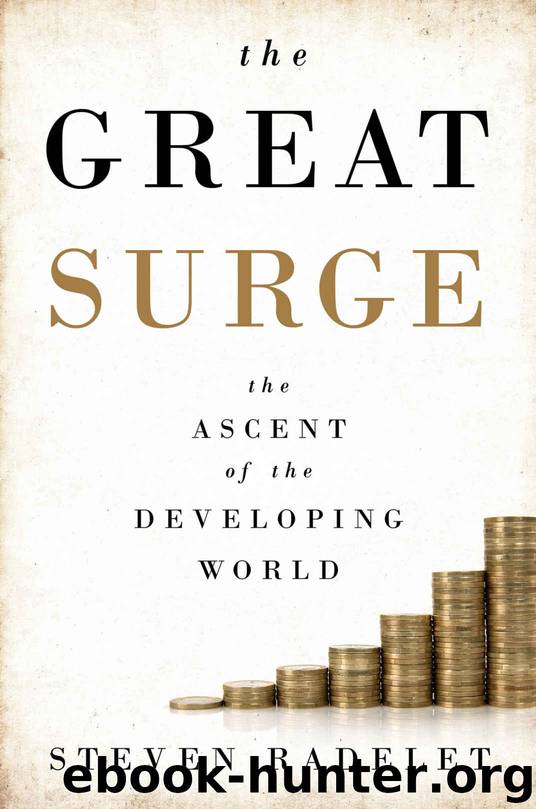The Great Surge: The Ascent of the Developing World by Steven Radelet

Author:Steven Radelet
Language: eng
Format: mobi
Publisher: Simon & Schuster
Published: 2015-11-09T14:00:00+00:00
LEADERSHIP AND ACTION
Why did most developing countries begin to move forward over the last several decades, while others did not? The forces I discussed in the previous two chapters—the end of the Cold War, the demise of Communism, the acceleration of globalization, and the spread of new technologies—created much better global conditions and generated big opportunities for development. But while around two-thirds of developing countries began to change direction and take advantage of those opportunities, others did not. Why?
The answer lies primarily in differences in decisions and actions taken within developing countries, and the leaders that guided the process: heads of state; senior government officials; business, community, civil-society, and religious leaders; and others who made the choices and took the actions that began to move countries in new directions. In countries that progressed, leaders forged change, built more effective institutions, introduced new policy directions, and installed good governance.
In addition to governance and leadership, another factor that partially distinguishes country performance is geography: access to global shipping routes (and with it, greater access to the benefits of globalization and technology), soil quality, climate, and natural resources. Countries or regions with more favorable geography had more options and opportunities and tended to make more progress. It’s a lot harder to make progress in remote, arid countries with heavy disease burdens.
The most important factors are leadership and governance. Leadership matters, particularly at critical moments during historical transitions. Sometimes the fate of a nation rests with individual leaders and the choices they make, for good or for ill. The end of the Cold War created the opportunity for change, and globalization created an important set of mechanisms for progress, but neither guaranteed that capable leaders would emerge who would make the right choices. Many did: along with Mandela, there were Lech Wałesa in Poland, Václav Havel in the Czech Republic, Corazon Aquino in the Philippines, José Ramos-Horta in Timor-Leste, Oscar Arias in Costa Rica, Ellen Johnson Sirleaf in Liberia, and many others who led their countries in new directions and began to build more effective institutions and new systems of governance and accountability.
Effective leadership tends to spread from one country to another. When the leaders of one nation establish new political and economic directions and begin to show progress, citizens and leaders of neighboring countries take notice. Success tends to create peer pressure, as citizens expect to see matching success, and good leaders can become models for others to follow. (However, Fascism and Communism showed that bad leaders can also become models, unfortunately.) When I lived in Indonesia in the 1990s, government officials regularly wanted to know what South Korea and Singapore had done on a particular issue. South Africa’s peaceful surge became a model for many other African countries. During the past twenty years, there clearly has been some contagion effect at work: the more a country makes progress, the more others look to it as an example. Good leadership in one country helps throughout the neighborhood.
However, over the last two decades, effective new leaders did not always emerge.
Download
This site does not store any files on its server. We only index and link to content provided by other sites. Please contact the content providers to delete copyright contents if any and email us, we'll remove relevant links or contents immediately.
The Meaning of the Library by unknow(2564)
Six Billion Shoppers by Porter Erisman(2296)
Why Nations Fail: The Origins of Power, Prosperity, and Poverty by Daron Acemoglu & James Robinson(2285)
No Time to Say Goodbye(2112)
Red Notice by Bill Browder(2070)
Currency Trading For Dummies by Brian Dolan(1921)
The Economist [T6, 22 Thg9 2017] by The Economist(1916)
Thank You for Being Late by Thomas L. Friedman(1766)
Bitcoin: The Ultimate Guide to the World of Bitcoin, Bitcoin Mining, Bitcoin Investing, Blockchain Technology, Cryptocurrency (2nd Edition) by Ikuya Takashima(1694)
Amazon FBA: Amazon FBA Blackbook: Everything You Need To Know to Start Your Amazon Business Empire (Amazon Empire, FBA Mastery) by John Fisher(1559)
Coffee: From Bean to Barista by Robert W. Thurston(1539)
The Future Is Asian by Parag Khanna(1480)
The Great Economists by Linda Yueh(1453)
Grave New World by Stephen D. King(1418)
How Money Got Free: Bitcoin and the Fight for the Future of Finance by Brian Patrick Eha(1418)
Pocket World in Figures 2018 by The Economist(1414)
Capitalism Without Capital: The Rise of the Intangible Economy by Jonathan Haskel(1391)
The Sex Business by Economist(1378)
Cultural Intelligence by David C. Thomas(1286)
